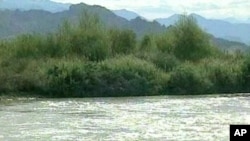Pakistan is struggling to recover from its worst flooding in decades, but the country also faces a different kind of water problem - not too much, but too little.
As flood waters recede from towns and cities in Pakistan, the focus is shifting to recovery and the challenge of aid distribution. Experts on the region say that in addition to displaced thousands, devastated agricultural crops, water - and the country's lack of it - will also be a major problem.
"Even before the floods, Pakistan's water infrastructure was a mess," said Michael Kugelman, a program associate of the Asia Program at the Woodrow Wilson International Center for Scholars. "And that's mainly because canals, pipes, other water conveyance structures were simply not properly maintained."
In 2009, the Woodrow Wilson Center released a report that called Pakistan's water situation extremely precarious and noted that water levels have plummeted since the 1950s.
The World Bank says the impact of melting glaciers in the Himalayas, triggered by what some scientists say is the impact of global warming, could lead to 30 to 40 percent less water over the next 100 years.
Steven Solomon is the author of Water: the Epic Struggle for Wealth, Power and Civilization. He says while Pakistan's major source of water is the Indus River, much of it no longer reaches the sea.
"They are overdrawing pretty much the Indus River already, which is their equivalent to the Nile River in Egypt. It is their lifeline," said Solomon.
Pakistan already struggles to combat militants and poverty, and analysts say how it manages its water resources will play a key role in determining whether it faces even more instability.
"Water is probably one of the most politicizing issues in Pakistani politics, particularly because it not only fosters, but exacerbates provincial tensions," added Kugelman.
Analysts note that Punjab province, upstream on the Indus river, has the country's best farmland, while Sindh province has less water, and less farmland. This makes southern residents feel they are not getting their fair share of the resource, and raises tension with Punjabis, who tend to be more wealthy and politically connected.
Kugelman says water also is a source of tension with neighboring India.
"Dams are built, and are being constructed. Lands of Pakistan are getting barren, there is a severe crisis, UNO is not bothered, no body is putting bans, no one is stopping them [India] from constructing dams," said Hafiz Saeed, head of Lashkar-e-Taiba, the Pakistan-based terror group accused of carrying out the Mumbai terror attacks.
U.S. officials see the importance of water as a foreign policy tool, and part of the current, multi-billion dollar aid package to Paksitan is devoted to water projects.
"There is a consciousness of it in the State Department at the highest levels that never was there before. I think Pakistan was clearly one of the first instances that we tried to address some of the water needs," noted Author Steven Solomon.
However, analysts note that Pakistan will need much more civilian aid than the United States has offered. And that is crucial, they note, in a country key to American security interests in the surrounding region.














